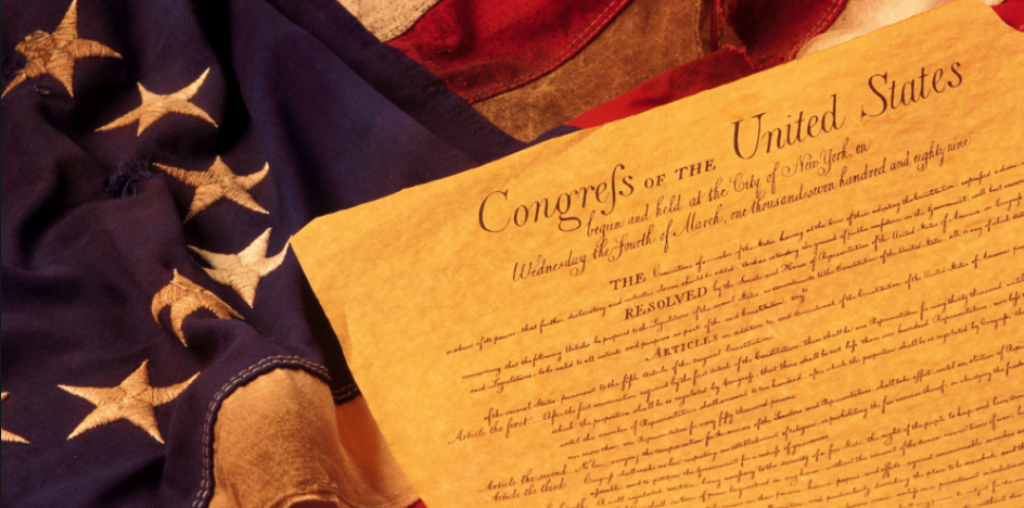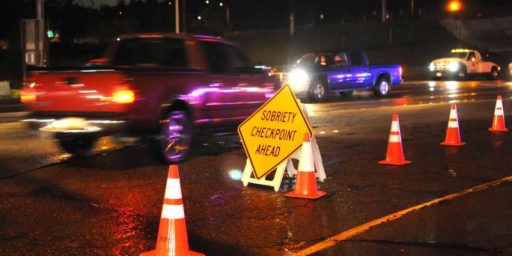Supreme Court Places Limits On Automobile Exception To Fourth Amendment
Yesterday, the Supreme Court ruled that a police officer violated the Fourth Amendment when he conducted a search on a vehicle parked in a Defendant's driveway without a search warrant.

In a ruling handed down yesterday, the Supreme Court has ruled that police cannot search an automobile without a search warrant when it is parked within the “curtilage” of a suspect’s home and it is not readily apparent that the vehicle could be removed from the scene:
WASHINGTON — The Supreme Court ruled on Tuesday that police officers must generally have warrants to enter a home’s driveway in search of stolen vehicles.
The case arose from a search for a Virginia motorcyclist who twice committed traffic offenses while riding a distinctive orange and black motorcycle with an extended frame. Police officers gave chase, but the man eluded them. In one chase, the motorcycle reached speeds of more than 140 miles per hour.
Officer David Rhodes, of the Albemarle County Police Department, investigated that matter. Relying on a Facebook post from a Virginia man named Ryan Collins showing what appeared to be the same motorcycle at the top of a driveway, Officer Rhodes tracked down the address, which was the home of Mr. Collins’s girlfriend.
Officer Rhodes, without a warrant or an invitation, visited the property. He saw what appeared to be a motorcycle covered in a tarp, walked up the driveway and lifted the tarp. The motorcycle, it turned out, was stolen.
Mr. Collins was convicted of receiving stolen property after Virginia courts rejected his motion to suppress the evidence gained by the police officer’s search.
The question for the justices was whether the Fourth Amendment, which bars unreasonable searches, allowed this one.
The Virginia Supreme Court ruled that the search was proper under “the automobile exception to the Fourth Amendment’s warrant requirement.”
The exception, the United States Supreme Court has said, is based on the “ready mobility” of vehicles and “the pervasive regulation of vehicles capable of traveling on the public highways.”
On the other hand, the court has said, “when it comes to the Fourth Amendment, the home is first among equals.” The amendment’s protections, the court had ruled, extend to a home’s “curtilage,” meaning the areas immediately surrounding it, including driveways.”
Justice Sonia Sotomayor, writing for an eight-justice majority, said the case involved a clash of those two principles.
“The question before the court,” she wrote, “is whether the automobile exception justifies the invasion of the curtilage. The answer is no.”
“To allow an officer to rely on the automobile exception to gain entry into a house or its curtilage for the purpose of conducting a vehicle search,” Justice Sotomayor wrote, “would unmoor the exception from its justifications, render hollow the core Fourth Amendment protection the Constitution extends to the house and its curtilage, and transform what was meant to be an exception into a tool with far broader application.”
“Indeed, its name alone should make all this clear enough,” she wrote. “It is, after all, an exception for automobiles.”
Amy Howe analyzes the opinion for SCOTUSBlog:
In a near-unanimous decision authored by Justice Sonia Sotomayor, the court began by making clear that the driveway where Collins’ motorcycle was parked was part of the curtilage protected by the Fourth Amendment. The court then explained that the justification for the automobile exception doesn’t consider a resident’s privacy interest in his home and its curtilage at all; rather, the rationale rests on the twin ideas that cars can easily be moved and are subject to regulation simply by virtue of being on the roads. None of the Supreme Court’s cases, the court continued, indicates that the automobile exception allows a police officer to enter the home or its curtilage without a warrant to search a vehicle – if anything, the court has emphasized the need to treat “automobiles differently from houses.” “Given the centrality of the Fourth Amendment interest in the home and its curtilage and the disconnect between that interest and the justifications behind the automobile exception,” the court concluded, “we decline Virginia’s invitation to extend the automobile exception to permit a warrantless intrusion on a home or its curtilage.”
The court also rejected Virginia’s fallback argument, which would allow police officers to enter some parts of the curtilage (such as the driveway) without a warrant to search a car, but not the house or other structures inside the curtilage, such as a garage. Such a rule, Virginia suggested, would give police officers a bright line to use when determining whether they need a warrant.
The court dismissed that idea, noting that officers have long made such evaluations regularly before executing searches. “Virginia provides no reason to conclude that this practice has proved to be unadministrable, either generally or in this context.” Moreover, the court added, Virginia’s proposed rule would mean that people who can afford garages would receive more protection under the Constitution than those who cannot.
The court left open the possibility that Virginia could still win its case against Collins under another theory – for example, by arguing that another exception to the warrant requirement might apply because of the possibility that Collins could have moved his motorcycle quickly. The court therefore sent the case back to the state courts for more proceedings.
(…)
Justice Samuel Alito was the court’s lone dissenter. He emphasized that if the motorcycle had been parked at the curb instead of in the driveway, the officer would not have needed a warrant. So why should the officer need one, Alito queried, to “walk 30 feet or so up the driveway”? “An ordinary person of common sense,” Alito suggested, “would react to the Court’s decision the way” a Charles Dickens character “famously responded when told about a legal rule that did not comport with the reality of everyday life. If that is the law, he exclaimed, ‘the law is a ass—a idiot.'” Moreover, Alito added, the only real question in the case is whether the officer’s search of the motorcycle was reasonable – which, in his opinion, it was.
The automobile exception to the Fourth Amendment that was at issue here goes back to virtually the beginning of the automobile industry itself. In a 1925 case called Carroll v. United States. In that case, which involved a search of a vehicle by Federal agents seeking to enforce the laws regarding the prohibition on alcohol sales that was put into place by the 18th Amendment, the Justices held that for purposes of the Fourth Amendment there was a difference between searches of a home or building and the search of an automobile, particularly when that automobile was on a public road and could easily be driven away. On the surface, it’s an exception that makes sense given the fact that even today the nature of traffic stops is such that it would be difficult if not impossible for police to obtain a search warrant without detaining the driver for a long period of time that, in and of itself, would arguably constitute an arrest, which of course can only occur if there is probable cause for the arrest.
Over the years that followed, there were several Supreme Court opinions that set the limits of what the automobile exception could and could not apply to when it comes to warrantless searches. in 1948’s United States v. Di Re, for example, the Court ruled that the automobile exception did not extend to passengers in the vehicle unless there was probable cause to believe that the passengers in possession of relevant evidence. Subsequent decisions upheld the idea that, as a general rule, the exception that Carroll had granted to automobile searches did not apply to passengers unless there was probable cause to believe that the passengers were accomplices to a crime or that they were abetting the crime by hiding evidence for the driver. More recently, the Court’s 2009 decision in Arizona v. Gant placed further restrictions in that the ruling states that police can only search the interior of the vehicle if it is reasonable to believe that the owner might access the vehicle at the time of the search, or that the vehicle contains evidence related to the reason for the owner is under arrest.
In this case, it seems clear that the facts and circumstances to which the automobile exception ordinarily applies simply did not exist, and that the officer in question acted improperly in seeking to obtain a search warrant before advancing onto the Defendant’s property. This was not a traffic stop, and the motorcycle was not on a public street. Instead, it was within the property or, as the relevant Fourth Amendment cases call it, the “curtilage” of the property that as far as the office in question knew the Defendant considered to be his home. At the time, the only thing that the officer knew is that he was looking for a certain kind of motorcycle that had eluded police on two previous occasions and which was clocked going as fast as 140 miles per house. Arguably, this could be said to constitute reckless driving under the relevant Virginia laws, but at the time the officer lifted the tarp, he had no way of knowing if the vehicle underneath was the one he was looking for or not. Additionally, until he had done so and run the appropriate records search, he apparently had no idea or reason to believe that the motorcycle in question was stolen. Based on all of this, it’s clear that the officer’s actions were a violation of the Defendant’s Fourth Amendment rights, not to mention being a violation of the property rights of the Defendant’s girlfriend, who owned the property that was impermissibly searched.
As for Justice Alito’s dissent, the fact that he couldn’t get either Justice Thomas or Justice Gorsuch to sign on with him is a pretty strong indication of just how far off the mark his argument actually is. His argument pretty much ignores existing Fourth Amendment precedent and argues for giving police a level of discretion that I doubt even Justice Scalia would have agreed with. For example, Alito asks why an officer should need a search warrant to examine a vehicle parked in a driveway 30ft away from a public road that he could have searched that same without a warrant if it were parked on the public road instead. The answer, of course, is blindingly obvious. There is an obvious major difference between a vehicle parked in a driveway and covered with a tarp and one that is parked on a public road. The fact that he can’t see it, or is so biased in favor of law enforcement that he simply chooses to ignore it, is more an indictment of him than it is of existing Supreme Court precedent. In his dissent, Alito referred to a phrase that entered the Anglo-American idiom thanks to Charles Dickens’ Oliver Twist, in which a character named Mr. Bumble states “The law is a ass - an idiot.”Well, you’re half right, Justice Alito. There’s an ass here, but it’s not the law.
Here’s the opinion:
Collins v. Virginia by Doug Mataconis on Scribd






So about that post yesterday concerning inquiries into the biases of judicial nominees… 🙂
@Kathy:
I still think it is improper to ask Judicial Nominees for their opinions on issues that might come before them, especially since it would be a violation of the ethical rules governing judges for a judge to answer such questions or otherwise pre-judge the issues that might come before them.
Is it possible for someone to be wrong and NOT an ass?
But if it’s visible, can he just look in the window and get the license plate? This example doesn’t quite seem appropriate.
I guess the lesson here is, knowing the motorcycle is there (from the FB posting), just wait until someone comes home.